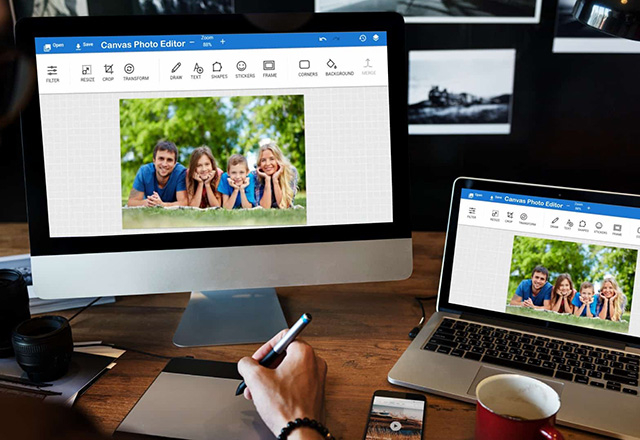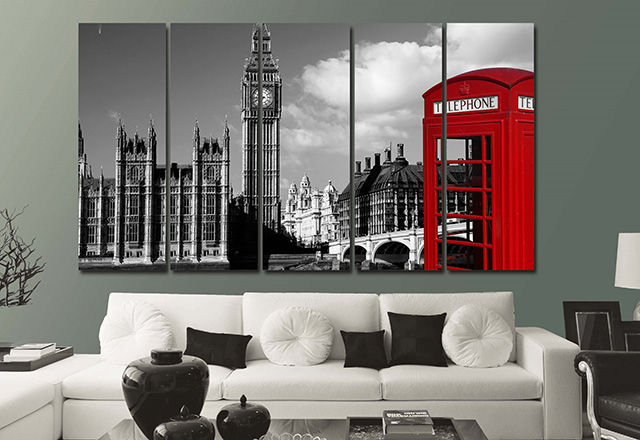How To Print On Canvas | A Step-By-Step Instruction To Make Your Own Canvas

Last updated: Jun 25, 2021
Gossby Experts
Feeling like starting an art and craft project? This article will teach you how to print on canvas. You will be surprised by the result because the canvas is a very versatile material to print on. Scroll down and create stunning and vivid artworks from scratch without breaking the bank with us.
03 Ideas For Canvas Print
Before heading to our guide on how to get a picture printed on a canvas, you have to have a picture first. Here are some canvas ideas for you:
1. Canvas Themes
You can search and buy the prints that you like online. The themes can vary depending on the settings in which you plan to put/ hang your canvas.
For example, if you want to redecorate your office, opt for inspirational quotes or landscape pictures. Minimalist style is the safest bet.

However, you can be bolder and think outside the box when it comes to your house. For instance, you can choose impressive, abstract pieces for your living room, bedroom, and kitchen.
You may also think about having a hallway gallery with the family photos since that is a popular way to decorate houses. One piece of advice is to not be greedy. Leave out photos that you find amusing but may embarrass your family members in front of guests.

2. Canvas Displays
The most common way to display the edge of your print is gallery wrapped. You can also frame your canvas with a wooden frame, though we have seen people using duct tape. Hanging the canvas is also another interesting way to display it.

If it is your first time venturing with printing canvas, a single panel is a fine choice.
Simplicity is best!
Nonetheless, collages and multi-panels are exciting options to consider. They can be daunting and time-consuming, but the final results are satisfying.
3. Canvas Shapes & Sizes
Your canvas print can come in different shapes and sizes. Canvas does not always have to be rectangular. Shapes like hexagons or ovals might be harder to achieve, but they aren't impossible.
Check out our article to know more about Canvas Size Guide!
Types Of Canvas
Do you know that canvas is the catch-all term for different types of materials and finishes? Let’s dive in!
Materials
The type of material greatly affects how to put a print on canvas. Two types that are often used for canvas printing are cotton and polyester.
Having a high cotton content is preferable since it is more durable and excels at absorbing various colors.
Polyester, on the other hand, plays an important role in the stretching process.

Another option available is UV canvas. As the name suggests, the material protects the print from damaging UV light exposure. Therefore, it does not fade as quickly as other types of canvas.
Finishes
Three types of finishes are gloss, satin, matte, and whichever you choose all comes down to your personal preference.

Gloss brings out the vibrancy of the color of your print, so if achieving the right color is your top priority, go with this type of finish.
Many people preferred matte because it makes the printing look more fine-art while greatly reducing glare.
Yet, there is a little trade-off here. With matte, the colors are less accurate than with the gloss finish.Therefore, we have satin in between, trying to achieve the best of both worlds. Satin finishes look more vivid than matte while not dealing with glare issues like a gloss.
Types Of Printers & Ink to Print Canvas
You must understand some basics about printers and ink to know how to print on canvas.
Types of Printers
You can print on canvas using either inkjet or laser printers.
Laser printers are becoming a household name because they can print faster and have a lower cost per page.
However, inkjet printers will produce better-quality images of higher quality. Since they produce droplets of ink, instead of powder, like their counterpart, they lend more vibrancy and details to colors.
UV-curable printers are the latest trend that is not exactly designed for canvas printing. It does a great job when it comes to printing mounted or framed canvas, but not stretching canvas (gallery wrapped).

Types of Ink
If you have a laser printer at home, you will print your canvas using toner, not ink. Coming over to inkjet printers, two typical types of ink used for canvas printing are aqueous and solvent.

Aqueous is cheaper, but the resulting color is less vibrant and short-lived.
Solvent ink is slightly more expensive, but the longevity, and the resolution of the print, are superior.
The newly developed eco-solvent ink is another worth considering option. As the name suggests, it contains fewer toxic chemicals, thus produces fewer fumes, and does not require a ventilator.
Image Editing
Before getting into how to print photos on canvas, the image’s resolution is the first and foremost thing you need to look at when choosing an image.
Chances are, you will most likely stretch the image you have on your computer or your phone to a larger print. What looks fine on the screen might come out dull in real life. Thus, the larger the print, the higher the resolution needs to be.

For the same reason, you would rather have an underexposed than an overexposed image to avoid it being noisy. We highly recommend running some test prints on normal paper before you try on the canvas.
While testing, pay attention to other specs like clarity, contrast, effects (watercolor, oil paint), and border. The effects would make the print look like a painting, while the frame depth would add some drama to it.
You can edit the image using your computer or editing app on your smartphone for the best result. The texture tool in Photoshop is incredibly useful to help you decide whether your chosen pictures would look great on canvas.
Printing Canvas Instruction
Step 1: Double-check to make sure there is enough ink for your printing. For what seems to be crucial and obvious, this step is often overlooked.
Step 2: Add leader strips to the back of your canvas at the bottom. This action helps feed the sheet into the printer more quickly and accurately.
Make sure that leader strips run the whole width of the canvas, straight and flush against the sheet. Otherwise, the printing may be skewed (which will be very noticeable if you have a landscape picture), and the printer will encounter a paper feed error.Step 3: Adjust some print settings on your computer since the default one is likely not for rear-manual. There are size options for the paper and the canvas print. If your final product is bordered on all sides, it is important to distinguish these two parameters.
Playing around with the settings ensures that you do not miss anything, from the border, centering, paper size, quality to the color. Again, we recommend that you print a test page with normal paper.Step 4: After you are done with the settings, feed the canvas into the printer with the front (the side that will be printed on) facing up.
Additionally, since the canvas is considerably thick, using the top feeder may cause paper jams. It is advisable to use the rear manual feed slot, for it is designed to handle thicker or oversized sheets.Step 5: Finally, we are here at the last step – print your work. Remember to leave your canvas until it is completely dry to avoid smudging.
Printing Canvas - Frequently Asked Questions
We have shown you all the steps on how to print pictures on canvas. If you, like most people, wonder about how to maintain it, here are our answers to the most frequently asked questions:
Question 1: What Is The Best Way To Clean Canvas?
Answer: For everyday cleaning, use a soft dry cloth to wipe the print surface to eliminate any dirt or dust coating. Remember that the cloth needs to be soft to not scratch the printing, while it has to be dry since most inks are not water-resistant.
This may sound like a no-brainer, but keeping the canvas somewhere dry and clean is the best way to save you from the cleaning hassle.
Question 2: How Can I Keep Canvas From Fading?
Keeping from direct sunlight, humid and moist
Laminating/coating
Framing the print with a glass cover
More information about "Canvas":
Final Thoughts!
Hopefully, you know how to print on canvas now and are confident enough to start your DIY project. Canvas is often thought of as an exclusive medium for artists. However, it is not true as everyone can make wonderful canvas art as long as they have enough patience and follow through with all the steps in our guide.


View More

View More

View More

